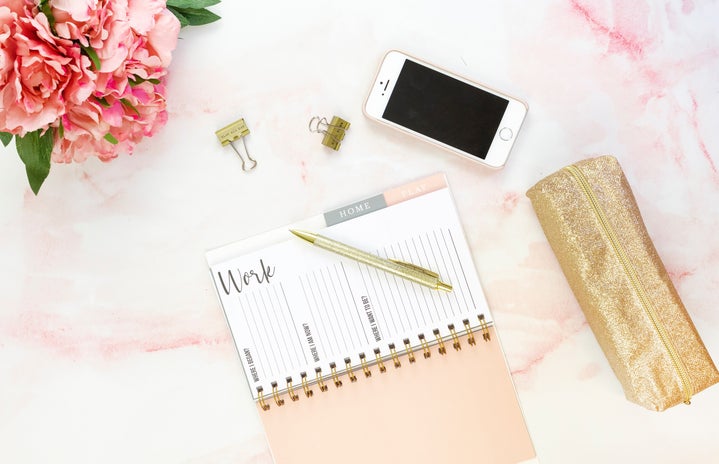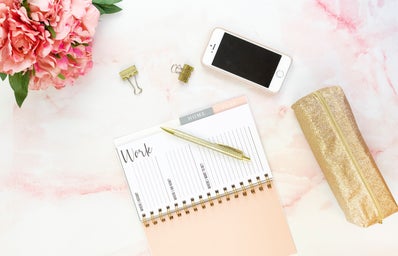If you happen to come across this article while putting off the work you’re actually supposed to be doing, congratulations; me too. On the outside I appear calm and composed as ever, a model honors student who never misses an assignment. As I write this, however, I have two five-page essays, one hundred-ish pages of reading and two quizzes. Pretty manageable for a school week, right? Except it’s not really a school week when it’s all due within forty-eight hours. But let’s not panic. Take it from someone like myself, who has spent years honing in on the art of procrastination: if you follow a few key steps, the work’s going to get done.
Step one: Write it down. Seriously, get out a pen and paper, and hand write everything that’s due, including pages to read, papers to write and tests to take. Don’t bother writing it in any specific order for now; the point here is to get everything out of your brain. Stop telling yourself you’ll remember to post on that discussion board even if you don’t write it down. Odds are, if you’re juggling a lot of work at once, something is bound to slip through the cracks.
Step two: Prioritize. Here’s where we move stuff around. Make a second list of things due the soonest. Say it’s Sunday night, and you have a paper and two readings due Monday. These items obviously take priority because they’re due the soonest. Next, pick the smallest or easiest task and do that first. If one reading is ten pages and the other is fifty, you may think getting started on the longer one is more helpful. However, you’ll actually just spend more time thinking about everything else you have to do instead of absorbing the information of the longer reading. Trust me, I’ve been there. By knocking out the smallest task first, you can physically cross it off your list and breathe a sigh of relief. One less thing to do, one less thing to worry about.
Step three: Distraction. One of my biggest challenges has always been staying off my phone and concentrating. A lot of people may say to put your phone on Do Not Disturb or place it in another room, but if you’re an addict like me, this will only lead to failure. Why? When your phone is on Do Not Disturb, there are no notifications lighting up your screen. After a few minutes, you begin to wonder if that cute boy from chemistry has snapchatted you recently. But since you don’t have notifications on, you’re in the dark. You should be studying, so don’t pick up your phone. Well, maybe one glance won’t hurt? And now you’ve wasted precious study time pondering if you have notifications. Before long, you’re picking up your phone out of curiosity to see if anyone’s trying to reach you, and then getting disappointed when your home screen is empty. The best method I’ve come up with is to leave your phone as is. Let it sit face up, a few feet away from you, so that you can see notifications light up and acknowledge them, but not interact with them. Then, give yourself mini-goals before you check your phone. For example, read five pages before answering a text. Study for fifteen timed minutes before reading that email. Trying to go cold turkey from your phone will only result in more stress and wasted time.
Step Four: Maximize breaks. I am a serious believer in self-care, maybe at times too much. Self care night but six days a week? Go for it. In all seriousness, one of my favorite ways to treat myself in the middle of cramming my assignments is by watching a non-thought-provoking show on Netflix – Did someone say the Vampire Diaries? – while doing other tasks. There are certain givens you have to do in a day, like eat and shower, or maybe walk the dog or exercise. During these times, I always take my phone out and turn something on. It’s a nice way of telling my brain, We’re not thinking about schoolwork right now, we’re eating and relaxing. Otherwise, I fear I’d simply become consumed by the nagging voice in my head telling me I should be working instead of just decompressing. It’s unrealistic to be on the go twenty-four-seven, and your work will definitely still be there when you come back to it.
Step Five: Putting it all together. The best way I can show you what these steps look like together is by breaking down what my next two days will look like. I started by writing down my laundry list of tasks and then deciding what to prioritize. Tomorrow, I have one essay and all of my readings due. The next day, I have another essay and both quizzes. In terms of what is due first, I already know what I’m writing about for my essay; tonight I’ll outline it and try to write at least a page. In the morning, I’ll write a few more pages and then step away from it. The reading consists of one thirty-page article, and sixty pages in a book. Although the book may seem longer, I happen to know it’s an easy read and I’ll be able to do it fast, so I knock that off first. Then, I’ll come back to my essay, revise what I wrote and finish it up. Finally, with two entire items crossed off, I can tackle the denser thirty page reading. That night, I’ll also spend a few minutes organizing my notes for my quizzes, since both are open-note and won’t require too much studying. Before I go to sleep, I’ll also outline the second essay, but realistically won’t start writing it.
I believe one of the most important takeaways from being a habitual procrastinator is that you have to be gentle with yourself. If you’ve always been this way, I’ll be honest and say that you likely won’t change drastically. However, if you know how to make pressure work to your advantage, you can channel your anxiety about finishing an assignment into some amazing work. Take the time constraint as a challenge, not just to do something mediocre, but to see how well you can perform under pressure. There’s no use beating yourself up for putting it off until the last minute. The time has already passed, and nothing will change that. Also, don’t convince yourself you’ll get it all done Sunday night, but rather, be honest with yourself and accept that there may be a few early mornings and a few skipped social events. In the end, maybe you’ll even decide to dismantle your procrastinating ways. Although, if you’re like me, you’ll probably just put that off until next week.



